Mattress or Markets: Where to put your cash in 2023
One just needs to look at today's market to appreciate the fact that change is the only constant.
But change isn't something to be feared; rather, it should be embraced. But in order to successfully navigate today's markets, you need insights and strategies.
In this wire, you'll read some of the key takeaways from the Pinnacle Investment Summit 2022 - The Great Reshape event held in Sydney, including whether or not cash is a worthy asset class, whether valuations are still too high, the possible length of the current bear market, as well as a current of asset classes that seem born for the moment.
Note: The Pinnacle Investment Summit 2022 took place in Sydney on Wednesday 31 July 2022. These quotes and slides are taken from presentations during this summit.
Is cash trash?
Presenters were split about the value offered by holding cash.
Ray Dalio, a co-chief investment officer of the world's largest hedge fund, Bridgewater Associates, has stated repeatedly over recent years that “cash is trash”. According to Christopher Joye from Coolabah Capital, he may need a new catch cry because cash is beginning to look a whole lot better as central banks around the world slam on the brakes.
The market is pricing in a peak RBA cash rate of 3.9%. Meanwhile, Australia’s 10-year Commonwealth government bond yield is now 3.6% p.a., compared to just 1% in December 2021.
“Amazingly, you can get 12-month term deposit rates paying over 4% today,” says Joye.
"How on earth could you invest in [residential] property yielding 3%, or other asset classes such as commercial property that might be paying 3.5-5.5. So this increase in cash rates and discount rates actually throws a huge challenge to all asset class returns.”
But just because cash assets are returning more than property doesn't mean you aren't losing money in real terms.
"If you still have your money in term deposits, you are going backwards big time," says Dr Don Hamson, managing director at Plato Investment Management.
"If you're looking at 6% inflation and only getting 1-2% on your term deposits, you're going backwards by 4-5%, or, if you had a million dollars you're losing $40,000-$50,000."
This is bad news for retirees who depend on fixed income. As Hamson explained, if you retire with $1 million at -5% real return, your savings will have dried up by the time you're 72.
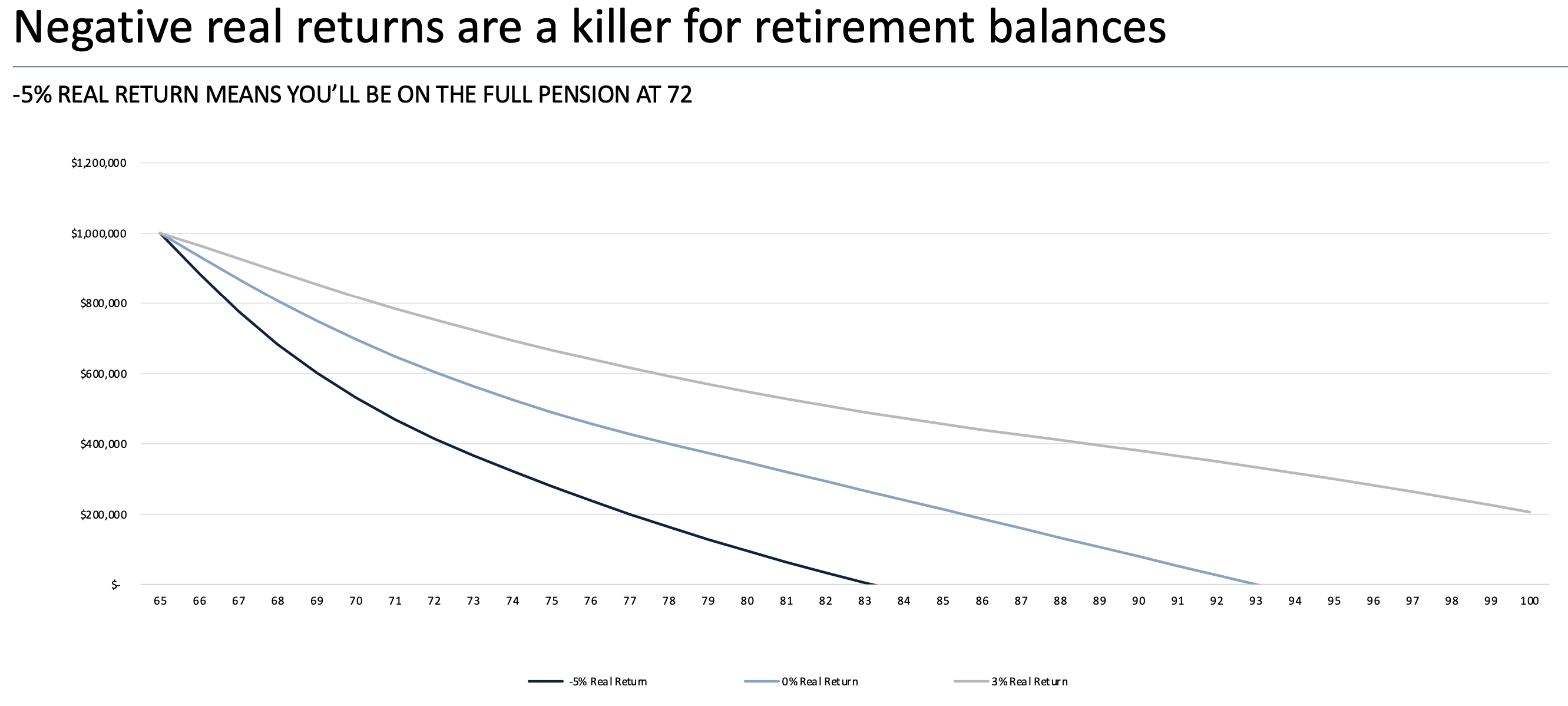
Source: ASFA, Plato, Services Australia. Assumptions: Homeowner couple, $1m starting assets, ASFA comfortable lifestyle, eligible for pension subject to assets test.
Valuations are out of step with inflation
Markets today are wracked with uncertainty.
Antipodes Partners has stagflation as its base case, which is bad news for equities that are arguably still overvalued.
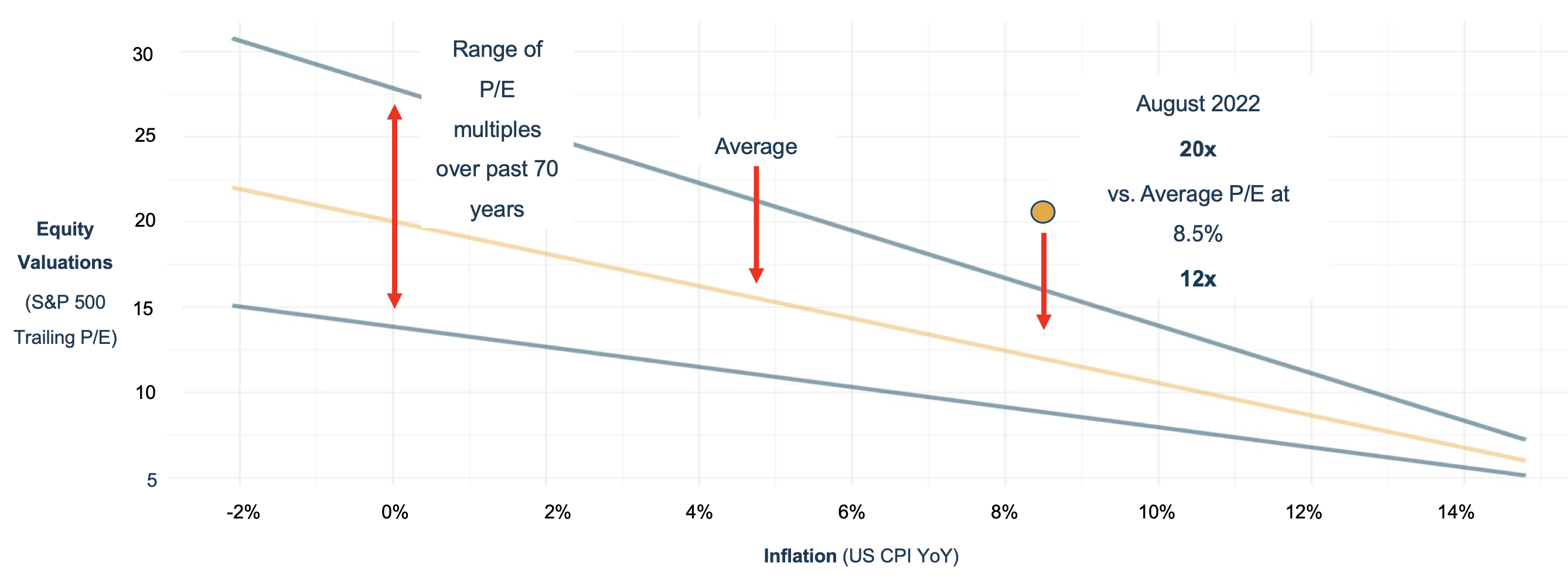
In the diagram above, Antipodes has mapped inflation rates against P/E rates over the past 70 years. As you can see, August valuations are not only above the long-term average, but well above the upper bound historically.
"Fair value at 8.5% [inflation] is a market multiple of 12 times," says Jacob Mitchell, CIO at Antipodes Partners.
Bear markets don't last forever
When things are bad, it can feel like things will never improve. But they do. What's more, bear markets don't last for nearly as long as bull markets.
Over the past 60 years, the average bear market has lasted just one year with an average loss of 35%, while the average bull market lasts five years with an average gain of 170%.
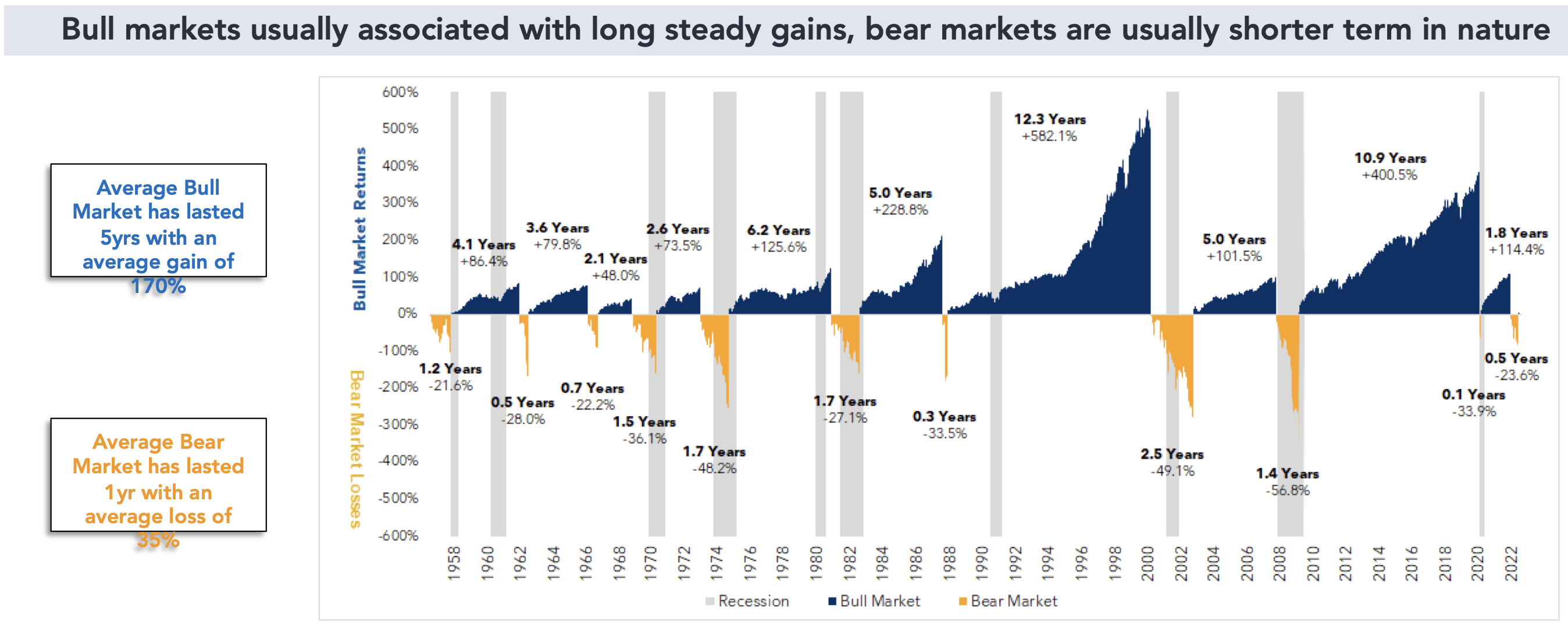
Source: RBC, Bloomberg. Reflects S&P 500 Index. The graph does not reflect costs. Past performance is not a guarantee of future results. The Bull market starts from the lowest close reached aftermarket has fallen 20% or more. The bear market starts from where the index closes at least 20% down from its previous high.
"You can clearly see the benefits of long-term investing and making good decisions in bear markets," says Michael Bell, CIO at Solaris Investment Management.
As the saying goes, you make money in the buying, and bear markets are the best time to buy.
"We are in a bear market in the US at the moment, so those good decisions are vital."
Don't write off G-REITS
When rates are shooting up, real estate isn't the first asset class that springs to mind when on the hunt for attractive returns.
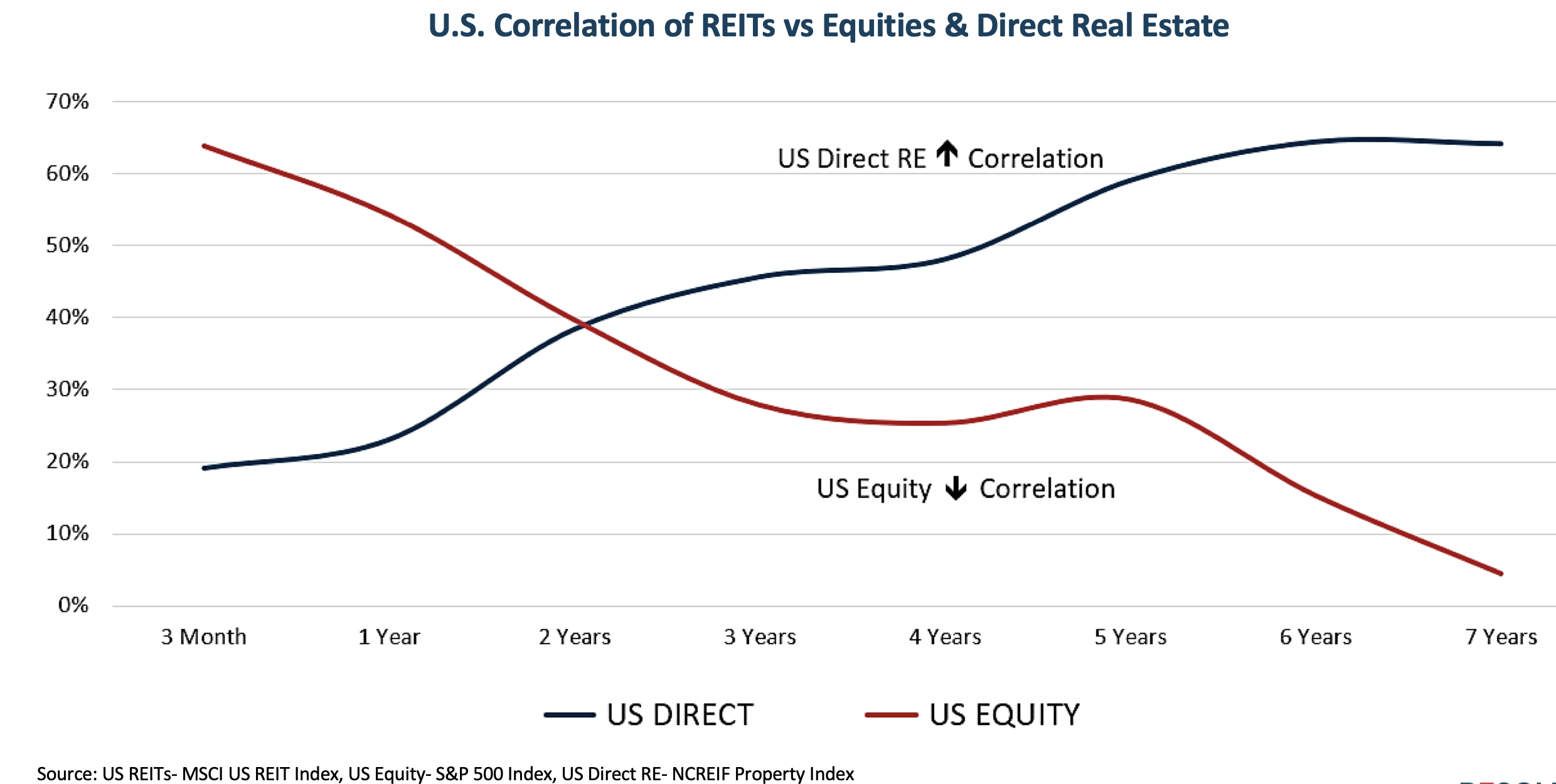
"Ultimately price and value converges given time, and that's why we think global real estate is a great surrogate for direct real estate," says Andrew Parsons, CIO at Resolution Capital.
Over 28 years, global real estate has provided returns of 7.8%, the same as global equities and 3.7% more than global bonds.
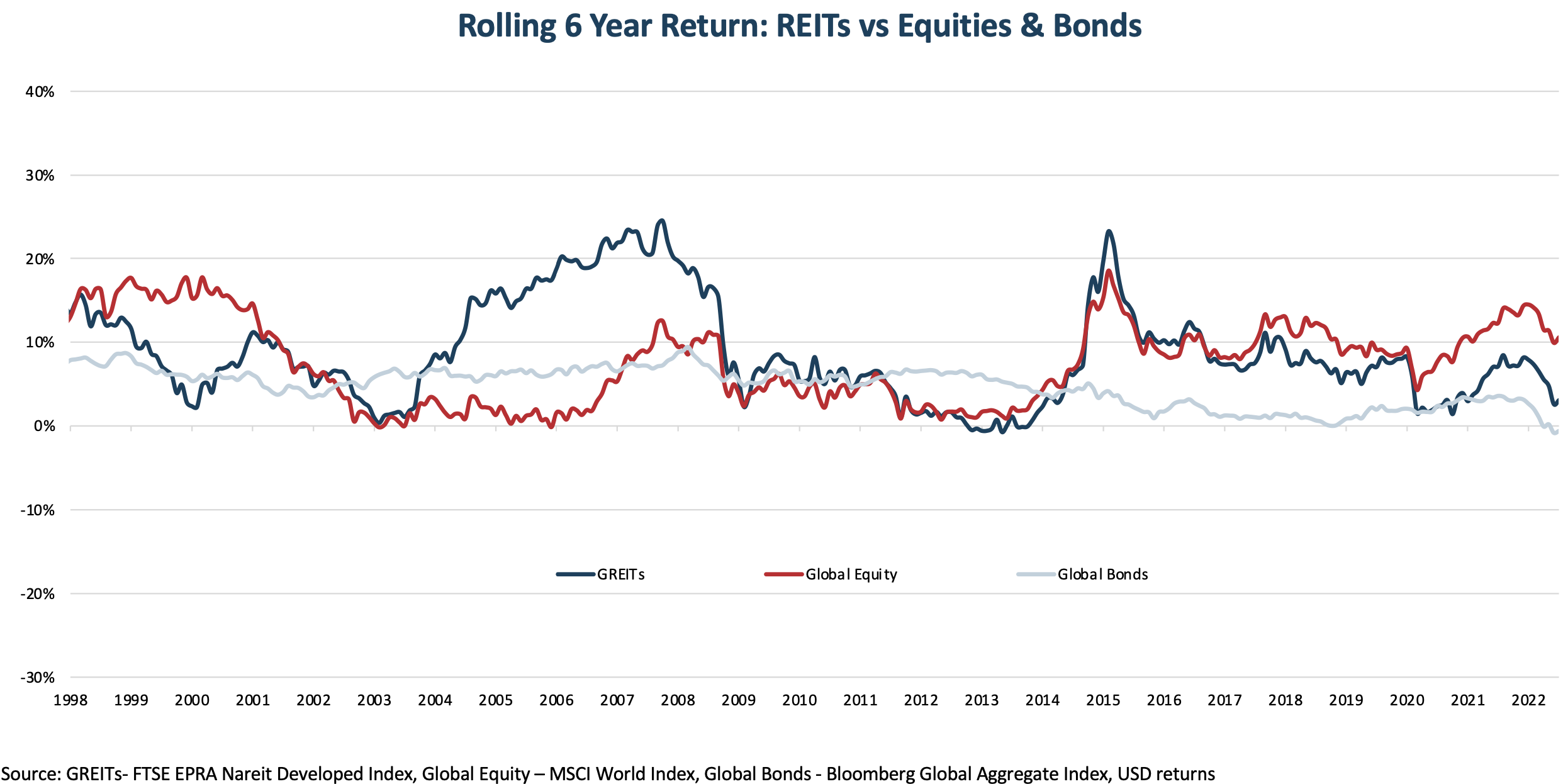
Over six years, meanwhile, global REITs have outperformed global equities and global bonds alike.
Is private debt the ultimate de-risked asset class?
"For the vast bulk of Australian investors, they don't need to be exposed to currency risk, lending or securities that are in a weak jurisdiction in terms of the legal protection, and often those assets are skewed towards high-yield or sub-investment grade exposures, often exposing investors to a risk of capital loss that doesn't exist in Australia," says Andrew Lockhart, managing partner at Matrics Credit Partners.
Investing in private debt side-steps much of that risk.
"As a private lender looking to work with or compete against the banks to provide financing to Australian companies, it's a function of the Australian market that the kinds of assets and exposures we have are quite different to the exposures that investors would have in offshore markets," says Lockhart.
Private debt as an asset class also de-risks your portfolio thanks to the floating rates of most of the loans and the diverse markets in which these loans are made, adding instant diversification.
Presently, investors in the Metrics Master Income Trust (ASX: MXT) receive a 3 year net return of 4.76%, while the Metrics Income Opportunities Trust (ASX: MOT) returns 8.66% over the same timeframe.
Missed the Summit? You're in luck
The 2022 Pinnacle Investment Summit, held in September, captured all our major asset classes, best ideas, key Insights and outlook from nine of Australia’s leading Fund Managers.
You can catch up on all nine presentations by clicking here.
2 stocks mentioned
6 contributors mentioned

